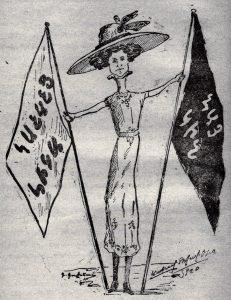WATERTOWN, Mass.—The Armenians of Istanbul, Turkey, faced extraordinary conditions in the 1920’s. Reeling from the chaos and losses of the World War I genocide, they had little to guide them as they looked to the future.

In this in-depth study of the aftermath of the genocide among the surviving Armenians remaining in Istanbul, Professor Lerna Ekmekcioglu has analyzed publications of the period to trace the process of reconstructing the community. Her new book on the subject, Recovering Armenia: The Limits of Belonging in Post Genocide Turkey, recently released by Stanford University Press, explains the central role played by Armenian women in preserving traditions, memory, and language.
Professor Ekmekcioglu will present the book at an illustrated talk on May 5, beginning at 7:30 p.m. at the Armenian Museum of America, in a program sponsored jointly by the Armenian International Woman’s Association (AIWA), the National Association for Armenian Studies and Research (NAASR), and the Armenian Museum of America.
Recovering Armenia gives voice to the Armenian community’s prominent figures of the time, notably the activist and feminist Hayganush Mark, editor of the influential journal Hay Gin (Armenian Woman). Feminism among the Armenians, Professor Ekmekcioglu argues, reached its zenith in the immediate aftermath of the genocide and in the capital of Turkey. The occupation of Istanbul by the victorious Allies in World War I provided a conducive atmosphere for the development of the Armenian press. With the approach of Kemal Ataturk’s National forces toward the capital in the fall of 1922, however, many Armenians fled from the city and were barred subsequently from returning.

Mark managed to continue publication in the face of the declining Armenian population and the increasing hostility of the Turkish government. Professor Ekmekcioglu examines the dilemma faced by the Armenian community as it sought to accommodate itself to the demands of Turkish society while at the same time preserving its distinct culture and traditions. One approach to this dilemma was to pay extra attention to the Armenian family and home, a domain in which the Turkish government did not intrude aggressively.
In 1933 Hay Gin was closed by the government. But during the 1920’s Hayganush Mark and her colleagues managed to produce a lively journal, focusing on the issues of the day, emphasizing the woman’s duty to family and nation while at the same time calling for equal rights. But their viewpoint raised a basic paradox: could one be an Armenian and a feminist at a time when the key path for Armenians to maintain their identity was through traditionally gendered roles?
Dr. Lerna Ekmekcioglu is the McMillan-Stewart Associate Professor of History and an affiliate of the Woman and Gender Study Program at the Massachusetts Institute of Technology. A student of the modern Middle East, she specializes in Turkish and Armenian history at the beginning of the 20th century. Her work focuses on minority-majority relationships and the ways in which gendered analytical lenses help to better understand coexistence and conflict, including genocide, in the Middle East.
A native of Turkey, Professor Ekmekcioglu is a graduate of Bogazici University in Istanbul and received her doctorate from New York University. Her first book, co-edited with Melissa Bilal and published in 2006 in Turkish, is titled A Cry for Justice: Five Armenian Feminist Writers, from the Ottoman Empire to the Turkish Republic (1862-1933).
The public is cordially invited to attend this program, which will shed light on a significant but little known aspect of the Armenian experience in the 20th century.



Congratulations Lerna!